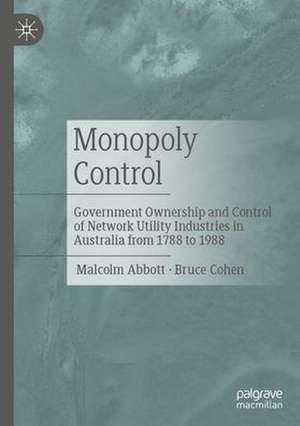Monopoly Control: Government Ownership and Control of Network Utility Industries in Australia from 1788 to 1988
Autor Malcolm Abbott, Bruce Cohenen Limba Engleză Hardback – 24 mai 2023
| Toate formatele și edițiile | Preț | Express |
|---|---|---|
| Paperback (1) | 691.10 lei 39-44 zile | |
| Springer Nature Singapore – 25 mai 2024 | 691.10 lei 39-44 zile | |
| Hardback (1) | 733.65 lei 6-8 săpt. | |
| Springer Nature Singapore – 24 mai 2023 | 733.65 lei 6-8 săpt. |
Preț: 733.65 lei
Preț vechi: 894.68 lei
-18% Nou
Puncte Express: 1100
Preț estimativ în valută:
140.39€ • 146.76$ • 118.64£
140.39€ • 146.76$ • 118.64£
Carte tipărită la comandă
Livrare economică 06-20 martie
Preluare comenzi: 021 569.72.76
Specificații
ISBN-13: 9789819927258
ISBN-10: 9819927250
Pagini: 376
Ilustrații: XVI, 376 p. 57 illus., 3 illus. in color.
Dimensiuni: 148 x 210 mm
Greutate: 0.62 kg
Ediția:2023
Editura: Springer Nature Singapore
Colecția Palgrave Macmillan
Locul publicării:Singapore, Singapore
ISBN-10: 9819927250
Pagini: 376
Ilustrații: XVI, 376 p. 57 illus., 3 illus. in color.
Dimensiuni: 148 x 210 mm
Greutate: 0.62 kg
Ediția:2023
Editura: Springer Nature Singapore
Colecția Palgrave Macmillan
Locul publicării:Singapore, Singapore
Cuprins
Part I: Setting the framework.- Chapter 1: Introduction.- Chapter 2: Australian economic development and network utilities.- Part II: The construction of the new infrastructure: the 19th century.- Chapter 3: Infrastructure development: industrialisation, institutions, private interests, and public capital investment.- Chapter 4: The colonial post office.- Chapter 5: Local supply networks: water and gas.- Chapter 6: Railways: emergence and development.- Part III: A new nation and its networks: 1901 to 1945.- Chapter 7: Infrastructure provision for a new nation.- Chapter 8: The development of telecommunications.- Chapter 9: Urban amenities: electricity, gas, and tramways.- Chapter 10: The railways: growth and decline.- Part IV: The post-war era: 1945 to 1988.- Chapter 11: The post-war world.- Chapter 12: Telecommunications: extending the network.- Chapter 13: Urban growth and change.- Chapter 14: Transport: a new way forward.- Part V: Conclusion.- Chapter 15: Economic policy, service delivery, and productivity.
Notă biografică
Malcolm Abbott is an economist by profession who specialises in research in energy markets, water supply, transport, and network industries in general. In the past he has worked for the ACCC, KPMG, as a Ministerial Advisor, and as an Associate Professor of Economics at the Swinburne University of Technology in Australia. He holds a Ph.D. from the University of Melbourne.
Bruce Cohen is a private consultant and former barrister who has worked extensively in the energy and water sectors in Australia. He holds a Ph.D. in Public Policy from The Australian National University and has been a member of the board of directors of a number of utility companies, a Commissioner of the Victorian Competition and Efficiency Commission, and a former Chair of VicTrack and the Victorian Commission for Gambling and Liquor Regulation.
Bruce Cohen is a private consultant and former barrister who has worked extensively in the energy and water sectors in Australia. He holds a Ph.D. in Public Policy from The Australian National University and has been a member of the board of directors of a number of utility companies, a Commissioner of the Victorian Competition and Efficiency Commission, and a former Chair of VicTrack and the Victorian Commission for Gambling and Liquor Regulation.
Textul de pe ultima copertă
This book traces the historical development of the network utilities sector in Australia (communications, rail, gas, electricity, water supply, and sewerage services). It looks across industries, time periods and the state and federal jurisdictions, to identify what motivated the various governments to establish these enterprises and what issues arose. The book is therefore informed by the relationship between politics and society on the one hand and economic history on the other; as well as the efforts of governments in Australia to promote economic growth and the wealth of Australians. The main focus of the book is to identify and analyse the following two main questions: (i) What were the main drivers and motivations for governments establishing government-owned business in the network utilities sector? (ii) To what degree were these government-owned businesses successful at achieving the aims of these governments? In doing so the inherent characteristics of these industries are identified, in terms of their need for rights of way, network effects, the monopoly characteristics, and the potential for stimulating growth.
Malcolm Abbott is an economist by profession who specialises in research in energy markets, water supply, transport, and network industries in general. In the past he has worked for the ACCC, KPMG, as a Ministerial Advisor, and as an Associate Professor of Economics at the Swinburne University of Technology in Australia. He holds a Ph.D. from the University of Melbourne.
Bruce Cohen is a private consultant and former barrister who has worked extensively in the energy and water sectors in Australia. He holds a Ph.D. in Public Policy from The Australian National University and has been a member of the board of directors of a number of utility companies, a Commissioner of the Victorian Competition and Efficiency Commission, and a former Chair of VicTrack and the Victorian Commission for Gambling and Liquor Regulation.
Bruce Cohen is a private consultant and former barrister who has worked extensively in the energy and water sectors in Australia. He holds a Ph.D. in Public Policy from The Australian National University and has been a member of the board of directors of a number of utility companies, a Commissioner of the Victorian Competition and Efficiency Commission, and a former Chair of VicTrack and the Victorian Commission for Gambling and Liquor Regulation.
Caracteristici
Traces the historical development of the network utilities sector in Australia Highlights main drivers and motivations for governments establishing government-owned business Explores the degree to which government-owned businesses are successful at achieving these aims
